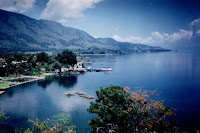 Kopi Luwak or Civet coffee originated from Indonesia. It is a type of coffee made from coffee berries which have been eaten and passed through the digestive area of the Asian Palm Civet (an animal). The Civets eat the berries, but the beans inside pass through their system undigested. This process takes place on the islands of Sumatra, Java and Sulawesi in the Indonesian Archipelago, in the Philippines (where the product is called Kape Alamid) and in East Timor.
Kopi Luwak or Civet coffee originated from Indonesia. It is a type of coffee made from coffee berries which have been eaten and passed through the digestive area of the Asian Palm Civet (an animal). The Civets eat the berries, but the beans inside pass through their system undigested. This process takes place on the islands of Sumatra, Java and Sulawesi in the Indonesian Archipelago, in the Philippines (where the product is called Kape Alamid) and in East Timor.Kopi is the Indonesian word for coffee, and luwak is a local name of the Asian Palm Civet. When the civet eats the coffee berry, the inner bean of the berry is not digested, but it has been proposed that enzymes in the stomach of the civet add to the coffee's flavor by breaking down the proteins that give coffee its bitter taste. The beans are defecated, still covered in some inner layers of the berry. The beans are washed, and given only a light roast so as to not destroy the complex flavors that develop through the process.
Kopi Luwak is the most expensive coffee in the world, selling for between $120 and $600 USD per pound, and is sold mainly in Japan and the United States. It is increasingly becoming available elsewhere, though supplies are limited; only 1,000 pounds (450 kg) at most make it into the world market each year.
BATIK
Batik is a wax-resist dyeing technique used on fabrics. Batik is considered as national art in Indonesia, Javanese batik, especially from Jogjakarta, where it has special meanings, as it is rooted to the Javanese idea of the universe. Traditional colors include indigo, dark brown and white, which represents the three major Hindu Gods and royals can only wear certain patterns. Patterns similar like the Javanese batik is also found in several countries of West Africa, such as Nigeria, Ghana, Cameroon, Uganda and Mali, and in Asia, such as India, Sri Lanka, Bangladesh, Iran, Philippines, Malaysia, Thailand and Burma, which displays the influence of the Indonesian batik internationally. Other regions of Indonesia have their own unique patterns.
Culture
Batik has been both an art and a craft for centuries. In Java, Indonesia, batik is part of an ancient tradition, and some of the finest batik cloth in the world is still made there.
Modern batik is markedly different from the more traditional and formal styles. For example, the artist may use etching, discharge dyeing, stencils, different tools for waxing and dyeing, wax recipes with different resist values and work with silk, cotton, wool, leather, paper or even wood and ceramics.
Procedure

A woman applying melted wax to the cloth

A man dipping a cloth in a dye.
Melted wax is applied to the cloth before it is dipped in dye. They usually use beeswax and paraffin wax. This is because the beeswax holds the fabric and the paraffin wax allows cracking, which is a characteristic of batik. The dye will not penetrate wherever wax has seeped through. Sometimes more colors are used with dyeing, drying and waxing steps.
Some other methods of applying the wax are pouring it, painting it on with a brush, applying it to pre-carved wood or metal wire block and stamping it onto the fabric. Thin wax lines can be made with a canting needle, a wooden handled tool with a tiny metal cup with a tiny spout, out of which the wax seeps.

A Batik painting depicting two Indian women.
After the last dyeing, the fabric is hung up to dry. Then it is dipped in a solvent to dissolve the wax, or ironed between paper towels or newspapers to absorb the wax and reveal the deep rich colors and the fine crinkle lines that give batik its character. This traditional method of batik making is called Batik Tulis, which means Written Batik in English.
Batik clothing usually has an intricate pattern. Traditionally, wider curves were reserved for batik produced for the upper class. Traditional batik’s natural colors are tones of indigo and brown while modern day’s has more variety of colors. Javanese batik typically includes symbols. Some pieces may be mystic-influenced, but very few.































